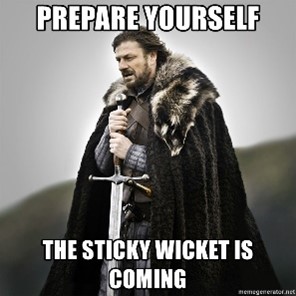Did your boss tell you the company’s sales strategy is a sticky wicket? This post unpacks the meaning and origin of this expression.
Meaning
The expression ‘sticky wicket’ means a challenging situation to navigate and overcome. It’s a metaphor to describe a difficult situation where you might not receive the expected outcome. If something is a ‘sticky wicket,’ you must tread carefully with your actions, or you might experience an adverse effect on your efforts.
A ‘sticky wicket’ can describe situations in life where you’re ‘walking a tightrope,’ and there’s a chance that things could end badly. It also describes conversations and situations where you must watch what you say to avoid offending someone else.
Example Usage
"We have a sticky wicket on our hands. Do we pay for the car repair or the electricity bill this month? Inflation is making our choices tough."
"Most Americans have problems managing their finances in this economy. It's a sticky wicket when you have to choose between paying for food or settling your credit card bill."
"This situation is a sticky wicket. So we go with the first supplier or the new one. It's challenging to decide on the right vendor for the business."
"I don't understand why this has to be a sticky wicket. It's a simple decision, you wither do or you don't. Stop playing around and make up your mind."
"Well, we have a sticky wicket here. Do we go to the cabin in the woods this weekend and have fun with the family? Or do we take them to the river and hang out with their friends?"
"I'm afraid the doctors are dealing with a sticky wicket here. They have to triage the patients to decide which of them need urgent care and who can wait for assistance."


Origin
The expression 'sticky wicket' originates from the sport of cricket. The wicket is the surface in the center of the cricket field. The soil comprising the wicket is compacted, allowing an adequate bounce in the cricket ball when 'bowled.'
So, playing on a 'sticky wicket' means that the ground is saturated, affecting to bounce of the ball and making it more challenging for the batsmen to play their shot. The phrase's first appearance in print occurs in "Bell's Life in London," published in July 1882, where it appears as follows.
"The ground... was suffering from the effects of recent rain, and once more, the Australians found themselves on a sticky wicket."
The first use of the figurative meaning of the expression appears in the Jamaican newspaper 'The Gleaner' in April 1930, as follows.
"Your Excellency, Sir William Morrison, and gentlemen. I am afraid tonight, owing to the rain we have had in this island of Springs, I am batting on rather a sticky wicket."
Phrases Similar to Sticky Wicket
- Big issue.
- Huge problem.
- Humdinger.
- Tough choice.
Phrases Opposite to Sticky Wicket
- Easy going.
- No problem.
- Comfortable situation.
What is the Correct Saying?
- Sticky wicket.
Ways People May Say Sticky Wicket Incorrectly
The phrase’ sticky wicket’ has nothing to do with cricket. It describes a challenging situation in life that’s hard to overcome. It’s common for this phrase to appear in the UK and Europe, where cricket is a popular sport. It’s less common to hear it in the United States, where cricket is an obscure game.
Acceptable Ways to Phrase Sticky Wicket
You can use the expression ‘sticky wicket’ to describe challenging situations in life. The term applies to professional and social conversations. You could say that the new policies around your sales team giving financial advice present a ‘sticky wicket’ that might land you in trouble with the financial services board.
If your car breaks down, you could say it presents a ‘sticky wicket’ because you don’t have any way to get to work the next day and no money to pay the repair bill. A ‘sticky wicket’ can apply to many situations in life involving tough decisions and outcomes.